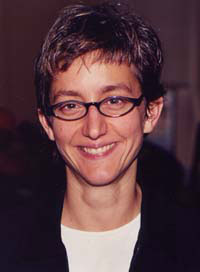Science Education at TC Takes the Initiative
Angela Calabrese Barton, Associate Professor of Science Education and Coordinator of the Science Education Programs, returned to TC from the University of Texas at Austin this year with an activist agenda.
Calabrese Barton and colleagues are revising both masters and doctoral programs in Science Education "to link our work here at Teachers College more closely with the schools and community based organizations. We want our students, whether they're studying to be teachers, teacher educators, policy makers or other kinds of practitioners to have the kinds of experiences that they need-both in and outside the university classroom-to prepare them to be leaders in their areas."
"What that means in terms of our programs," Calabrese Barton said, "is that we've established a new set of core courses with a concentration in urban science education for those students who want it, and new partnerships with two districts and schools in those districts and community based organizations to try and create those opportunities for our students." The partnerships are in District 10 in the Bronx and District 3 on the Upper West Side of Manhattan.
Another important initiative is the establishment of what Calabrese Barton calls the Urban Science Education Center-to improve urban science teaching and urban science education. "The issues surrounding science education in urban settings are urgent and varied. Urban schools that serve poor populations are understaffed, have few certified science teachers and offer limited science resources. Further, teachers with the strongest preparation in the sciences who freely elect to teach in the poorest city schools have the highest burn-out rate, leaving their inner-city teaching position before they have completed their third year of teaching," said Calabrese Barton.
According to Calabrese Barton, the Urban Science Education Center-funded partly by a grant from the National Science Foundation will be working closely over the course of the next three years with five low-income schools, three community-based, partnership scientists and science educators. Assistant Professors of Science Education Elaine Howes and Keith Sheppard have joined Calabrese Barton and she is reaching out to other faculty in other programs areas who might want to be affiliated with the Center.
Calabrese Barton said, "The mission of the Center is threefold: to rebuild our science programs at TC so that our graduates become leaders in urban science education; to work closely with schools in order to collaboratively rethink what science education might look like in urban schools; and to use what we learn in the schools and in our teacher education programs to educate those who make policy."
One project of the Center, entitled I USE Science (Improving Urban Schools Through Empowering Science Education), utilizes Teaching and Learning Teams to provide experienced teacher, pre-service teachers, and teacher educators opportunities to examine, design, implement and evaluate state of the art science education practices in their classrooms.
A second project, USE-IT (Urban Science Education with Integrated Technologies) offers after-school science programs to children in impoverished urban communities. "The focus of the after-school programs," said Calabrese Barton," is to work with children to create science that is meaningful and powerful to them in their lives. Alongside, we are developing case studies around the projects to develop a better understanding of how it is that children make connections between science and their everyday lives."
Another project is called Parents in Poverty and Science Education Reform. Calabrese Barton said, "This research focuses on parents in poor communities and the relationships they establish and the roles they play in elementary schools that serve in implementing reform-based education."
Elaine Howes commented on the fourth program of the Center, Science Learning with English Language Learners, which is funded by the Spencer Foundation. "In the capacity of a science education professor I work with teachers at PS 165 in trying to understand their learning, and to support them to meet the new goals of science education. The teachers at PS 165 work with some of the children to whom we implicitly refer when we use the rhetoric of 'science for all.' PS 165 is an urban elementary school that serves children in poverty, the majority of whom are learning English as a second language."
The focus of this ongoing study is inquiry into how teachers at this school think about and create instruction that responds to the national call for "science for all."
Published Thursday, May. 16, 2002
